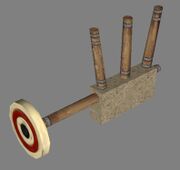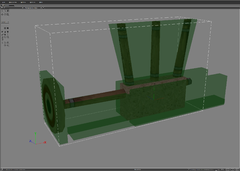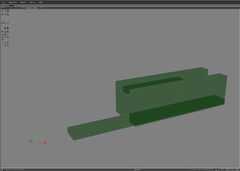Slider
| Chinese version / 中文版: | 活式木栅栏 |
|---|
 Silder after rendering the texture in Virtools | |
| Basic information | |
|---|---|
| Modul | P_Modul_01 |
| Name | Slider |
| Appears in | 1, 2, 5, 7, 9, 10, 11 |
The slider is an object that is recorded as P_Modul_01 in the game; it has the appearance of a cuboid stone inserted in a groove (wooden fence base) and three wooden sticks are inserted in the shape of " \ | / ", and another longer wooden stick that runs through the stone horizontally, and there is a target on one side for the player to push. The ends of the four wooden sticks are all reinforced with iron sheets.
Introduction
The slider is a common object in Ballance; it is mainly used to hinder the normal progress of the level road, and usually requires the player to push the target of the slider from another lower road to push it away.
In custom levels, in most cases, its function is the same as in the original levels. Sometimes the player is required to pass over the slider, using the slider as a short monorail (but in fact, due to the hitbox being a cuboid, the difficulty is much lower than that of the monorail). Players have to think about what circumstances the slider should be pushed.
In addition, the slider may be used as a Stopper, instead of its role, responsible for carrying other objects.
Since there is a shortcut ("Neo") where the player can directly pass the slider without pushing the target, when the slider is used as a standard function in custom maps, guardrails are placed around it to prevent the player from neoing.
Neo
Main article: Neo |
This is a very classic and important shortcut in Ballance, which refers to the shortcut for the player ball to cross the slider without having to push it down. See the main article for this paragraph.
Physical parameters
Unlike most objects in Ballance, which directly use the grid describing the shape as the collision volume when they are physicalized, some objects in this mechanism use special grids for their collision boxes. Meshes contained in this mechanism that are not used by 3D objects are actually used as object collision volumes.
| object | fixed | friction | flex | mass (tons) | linear damping | rotation damping | collision group | collision box grid |
|---|---|---|---|---|---|---|---|---|
| P_Modul_01_Pusher (the main part visible to the object) | no | 0.6 | 0.4 | 3 | 0.1 | 1 | P_Modul_01_Col01_Mesh P_Modul_01_Col02_Mesh P_Modul_01_Col03_Mesh | |
| P_Modul_01_Rinne (the part of the groove that allows the trap to work) | yes | 0.7 | 0.4 | 1.0 | 0.1 | 0.1 | P_Modul_01_Rinne_01_Mesh P_Modul_01_Rinne_02_Mesh P_Modul_01_Rinne_03_Mesh | |
| P_Modul_01_Filler (the part of the groove that allows the trap to work) | yes | 0.7 | 0.4 | 1.0 | 0.1 | 0.1 | P_Modul_01_Filler_Mesh |
Due to the fixed parts in the object, the slider can not rely on the support of the road to fix itself. In fact, since the movable part of the slider is the same as the collision group of the road surface, it will directly penetrate the road surface and fall after detaching from the fixed structure of the object itself.
Did you know
- If a slider is pushed away from the hitbox of a theoretically matching base (which would have the same effect even without a matching base), the slider goes "out of range", ignoring and penetrating all other normal roads.
- Although the slider can penetrate most traps and roads, because it can push a prop ball when it is pushed horizontally, the slider can still be used as a linkage mechanism.

